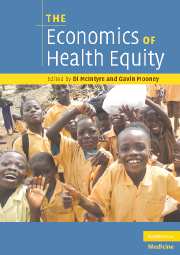Book contents
- Frontmatter
- Contents
- Contributors
- Biographies
- Acknowledgements
- Section 1 Introduction
- Section 2 Equity in general
- 2 Health and health inequalities in a neo-liberal global world
- 3 Governing the market in health care: the social and political requirements
- 4 Equity in the context of diversity of culture and diversity of economic systems
- 5 Beware of the libertarian wolf in the clothing of the egalitarian sheep: an essay on the need to clarify ends and means
- Section 3 Health service access
- Section 4 Equity and health systems
- Section 5 Lessons from individual countries
- Section 6 Future action
- Index
- References
3 - Governing the market in health care: the social and political requirements
Published online by Cambridge University Press: 22 August 2009
- Frontmatter
- Contents
- Contributors
- Biographies
- Acknowledgements
- Section 1 Introduction
- Section 2 Equity in general
- 2 Health and health inequalities in a neo-liberal global world
- 3 Governing the market in health care: the social and political requirements
- 4 Equity in the context of diversity of culture and diversity of economic systems
- 5 Beware of the libertarian wolf in the clothing of the egalitarian sheep: an essay on the need to clarify ends and means
- Section 3 Health service access
- Section 4 Equity and health systems
- Section 5 Lessons from individual countries
- Section 6 Future action
- Index
- References
Summary
Summary
The chapter opens with a brief overview of progress in advancing longevity and reducing ill health since the nineteenth century. The contributions of public measures for prophylaxis, sanitation, women and childcare, and improving the built environment, along with those of medication, are discussed briefly. The very recent incursion of big private drug companies and their associate providers of health, and their contribution in slowing down improvements in the period of neo-liberal reforms, especially in developing countries, are analyzed. The interrelationship of state failure and market failure in societies ruled by landlords and speculative capital in alliance with international corporate capital is brought out. The ironical situation of poor states training doctors who then serve badly financed health care systems of developed countries is scrutinized. The pollution of traditional knowledge through the agency of mercenary practitioners in an atmosphere of mass illiteracy, mass poverty and exclusion from their legitimate claims on the public sector is discussed. The social and political requirements for substantially abating the state failures and enabling the state to govern the market in the interest of the poor are discussed.
The axial ages of survival chances
For most of the history of humankind, the basic determinants of human health had little to do with any separable health care sector. Those determinants included the standards of nutrition, the environment of work and daily living, and the prevalence of pathogens in the environment and their rise or sudden eruption.
- Type
- Chapter
- Information
- The Economics of Health Equity , pp. 36 - 58Publisher: Cambridge University PressPrint publication year: 2007
References
- 2
- Cited by



